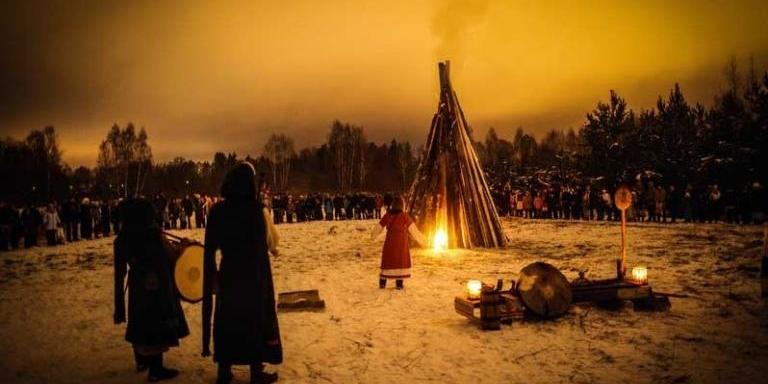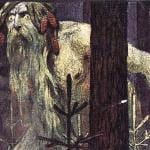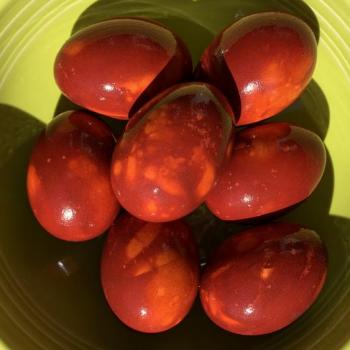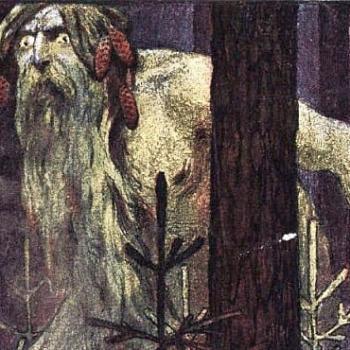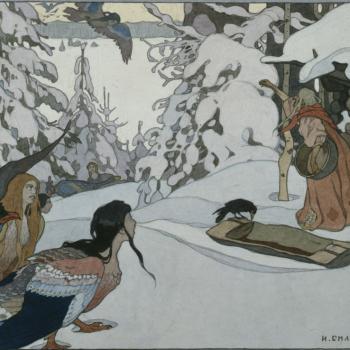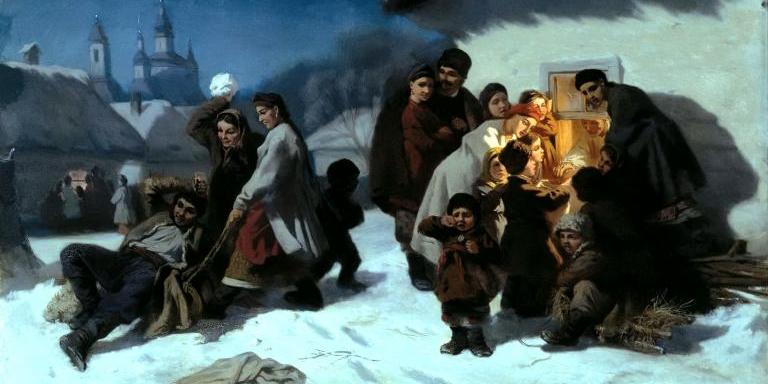
Kolyada: The Old Slavic Winter Solstice
On the darkest night of the year, when the world is cold and the sun only peeks out for a few short hours every day, we all need something to lift our spirits. In ancient times, this liminal period between the waning sun and the waxing sun was seen as a time of magic and so in almost every culture, there are rituals and rites that invite the sun’s return. The Slavic countries are no exception. Long before the advent of Christianity, we began to celebrate a special winter holiday filled with rituals to banish evil, invite abundance, and honor our ancestors. There was fun, feasting, dressing up, singing, dancing, and fortune-telling: the perfect activities to lift those long, dark night blues.
Kolyada (Коляда pronounced cole-yah-DAH), the name for these Winter Solstice celebrations, is a word so ancient that no one is quite sure of its origin. It may reference Kolyada, the infant sun god; Koliada, the ancient goddess of the sky who is responsible for the sunrise; or perhaps maybe a name that evolved from words referring to the calendar, the circle (kolo) of the year, or the turning of the sun in the sky. Indeed, Kolyada is said to welcome back the newborn sun and like the Western European “Twelve Days of Christmas,” the revels of Kolyada take place over several days. Originally, this celebration would have begun on the Winter Solstice but now these pagan traditions have merged with the Orthodox Christmas and so for many, these festivities start on January 6th and extend to the 19th.
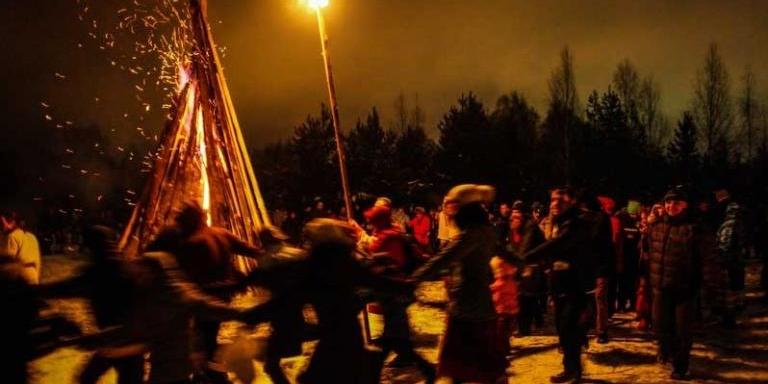
Caroling for Kolyada
Caroling for Kolyada is a ritual that pre-dates Christianity in Ukraine and is still quite popular today. In ancient times, the songs of the Ukrainians weren’t just beautiful, they were truly magical. Songs were (and still are) incantations and so the kolyadky (Коля́дки pronounced cole-YAHD-key), the special songs of Kolyada, bring blessings to the household. Like weaving a spell, it is still believed that everything that is sung about will come true.
On each of the days of Kolyada, bonfires are lit and carolers make their way from house to house carrying candles and lanterns to invite back the sun. Nowadays, people light fireworks and sparklers as well. These carolers go from door to door carrying musical instruments and papier-mache suns held high on sticks and ask for permission to perform for the family at the home that they are visiting.
When the group is invited in, the revelers go through a formalized series of performances, first reciting a greeting poem, then singing some carols, dancing, and then finally a humorous skit or puppet show with ribald jokes poking good-natured fun at the members of the household while wishing them abundance and love for the year. If the homeowners wish to receive these blessings, and avoid pranks by the carolers, they put gifts of food, sweets and money into the carolers’ sack. At the end of the evening, the carolers divide up their plunder and enjoy a feast.
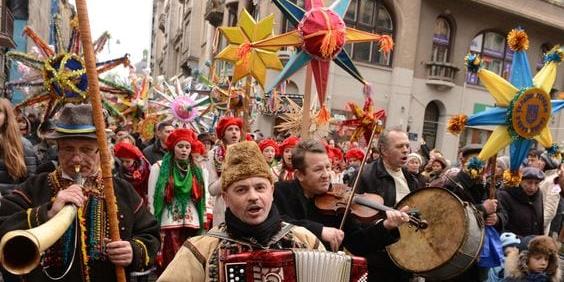
Welcoming the Solstice Goat
Often the revelers will dress up in mummers costumes, imitating animals such as the wolf, the bear, or the goat. At one time, these animals might have been sacrificed as an offering to the gods or the spirits, but nowadays are treated as special visitors from the spirit realm. Like ancient shamanic rites of times past, these animals are supernatural creatures from the lower world who can bestow blessings on us in the middle world. The goat, or koza (коза pronounced koh-ZAH), in particular, is seen as a fertility symbol, and is looked upon with special honor during the time when people want to call back the abundance of the spring, summer, and autumn.
This sacrifice is acted out in the plays presented by the carolers. A young man, wearing a sheepskin coat and a mask resembling a goat’s head with ears made of wheat, will perform a dance meant to bring an abundant harvest. The rest of the revelers will sing songs with lyrics such as “Where the goat goes, there wheat grows; where the goat stamps its feet, there are seven sheaves of wheat.” Then a pantomime ensues where the goat is pursued by hunters and wolves, and killed and gutted. The singers then call out, “Come alive, Goat!” and the goat rises from the dead and returns to the imaginary field, which also comes back to life. The reborn goat is then is led around the house by the children of the home who act out the sowing of wheat, and the goat finishes his performance with a blessing of abundance for the household: “May this farmer’s cattle be unbedeviled and full of milk, and may his oats sow themselves and his wheat be of the best sort.”

Food for the Dead
While all this fun and merry-making includes gifts of food and sweets, we Ukrainians never forget that our ancestors are always near. During the holidays, we make a special porridge of wheat berries, poppy seeds, dried fruit, nuts, butter, and honey called kutya (кутя pronounced koo-TYAH) which is served to our ancestors and shared with the living.
In the old days, the making of kutya had a special ritual. Wood would be stacked in a special way in the home’s wood-burning stove and lit with a “living fire” made from rubbing wood against wood. The wheat would be soaked in “untouched water” that was drawn from the well before the sun had risen and was believed to have been blessed during the night by Kolyada, the infant sun god.
While we might not cook on a wood stove today, Kutya prepared at this time is still considered very magical as it can foretell the future. If it is prepared improperly or does not taste good, it predicts a bad year and so it is thrown away and a new pot is made. If the batch is tasty, fragrant, and fluffy, however, it predicts a good year for the family and is eaten in the morning to fulfill this prediction.
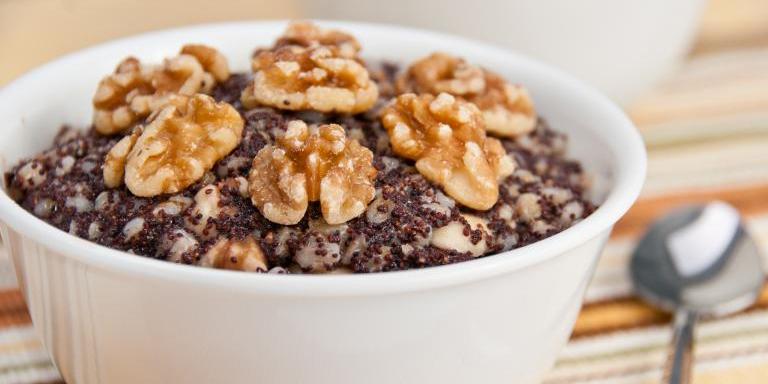
The Grandfather Made of Wheat
There is another practice to honor the ancestors which is a holdover from pagan times and that is the blessed sheaf of grains called a “didukh” (дідух pronounced DEE-dukh). The word didukh itself means grandfather’s spirit, and this sheaf of wheat, sometimes with rye and oats, represents a sacrifice from the autumn harvest. The wheat is decorated with ribbons and woven straw ornaments and is displayed in the house from Winter Solstice until the spring sun festival of Masnytsya.
It is believed that the didukh is the temporary home of the spirits of our ancestors, so it is placed in the special “beautiful corner” of the home, a place of honor, so that it will bless the family with abundance, health, and protection. A bowl of kutya and a glass of uzvar, a ritual drink made from dried fruit sweetened with honey, are placed next to the didukh to feed our beloved ancestors while they visit at this special time.
![]()
Kolyada Fortune Telling
In Ukrainian spirituality, we pay attention and honor the liminal – liminal times and liminal spaces are the moments and places where magic is the strongest. Legends of strange and unusual Kolyada phenomena such as animals having the ability to speak and blue flames pointing the way to buried treasure are said to occur during this season. And the liminal days when the old year is dying and the new year is beginning are thought to be one of the best times for telling the future. The dreams that you have during Kolyada are especially prophetic and can foretell blessings or warn of dangers so that they can be avoided.
This is also a time for festive fortune-telling games with friends and family. Growing up in my house, we always delighted in taking a peep at the future through these playful divination games. There are so many different fortune-telling methods and each family has their favorites, but I’ll share just a few that you can easily do during Kolyada.
Cut out twelve tiny slips of paper representing the twelve days of Kolyada and the twelve months of the year. On each slip of paper, write a wish for something that you would like to receive for the year. Put these paper slips under your pillow before you go to sleep. In the morning, pull three papers out from under your pillow. These three wishes are the gifts that you will receive in the coming year.
Wax divination is another activity that can be done to predict the future. Melt beeswax and pour it into a bowl of water. The shapes and configurations of the wax can be read in the same manner as tea leaves. The wax shape can also be held in front of a candle and the shapes seen in the shadow that it casts on the wall can be interpreted as symbols that will predict the future.
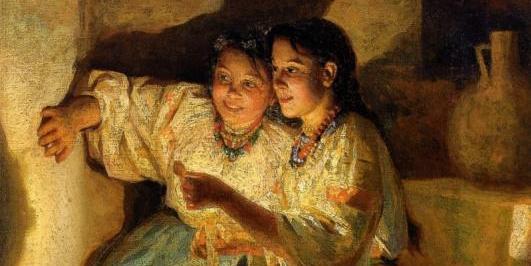
Fortune Telling Food
Since eating is such a big part of the holiday celebrations, it’s natural for there to be a fortune-telling and food mashup. Varenyky (вареники pronounced VAHR-eh-nick-ee), or pierogi, are delicious filled dumplings that can be turned into a fun Kolyada divination. The cook who makes the varenyky adds a little fortune-telling item to each dumpling and when they are served at the family meal, what you get in yours will predict what kind of year you’ll have:
- Coin – wealth
- Button – things will improve
- Pepper – a year full of thrilling and exciting events
- Thread – a trip
- Sugar – an easy, successful, and “sweet” year
- Ring – marriage
- Nut – two admirers at once
- Cherrystone – a baby will be born in your family
- Tomato – love
- Bay leaf – job or fame
- Peas – a peaceful home
- Dried apricots – a joyful year
- Walnut – a year of good health
- Buckwheat – you’ll receive some good news
- Mushrooms – longevity and happiness.
- Potato – a well-deserved career advancement
- Grain – a windfall
- Raisins – temptation
- Cranberries – favorable changes in life
- Honey – health improves
- Carrots – new and interesting acquaintances
- Meat – well-being in all areas of life
- Rice – a happy home
- Apple – a long-awaited award or prize
- Seeds – new and productive ideas
- Garlic – a financially successful marriage
- Bread – all your needs will be met
- Cottage cheese – new true friends.
- Dill – your health will be protected for the year
- Cucumber – good luck in sex
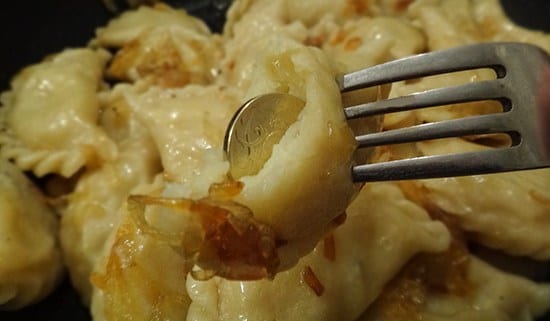
Enjoy the Fun and Magic of Kolyada
Kolyada is meant to be a time of relaxation, fun, friendship, and community. It is important at this time to connect with your loved ones, if not in person, at least in some time spent in thoughtful conversations. If you can’t go caroling from door-to-door, you can still call up your friends and wish them a year of health and abundance.
There is a very special reason that we celebrate each of the days with joy, friendship, and family, eating good food and having good times. How you carry yourself and how you live your life during Kolyada also predicts how your year will go. The experiences of each of the twelve days foretelling how each of the twelve months will go for you. It is important to be generous, happy, and mindful on these very special days to ensure that your year will go smoothly.
However you celebrate this special time of year, I wish you all the love, friendship, happiness, abundance, peace, and health of the season. “May your cattle be unbedeviled and full of milk, and may your oats sow themselves and your wheat be of the best sort.”
